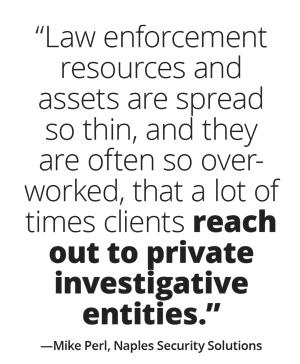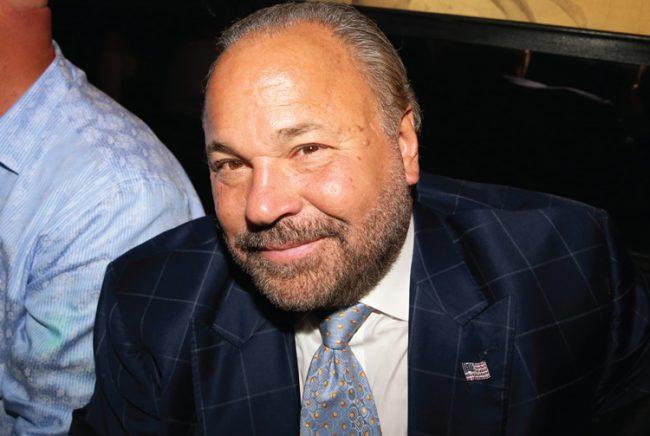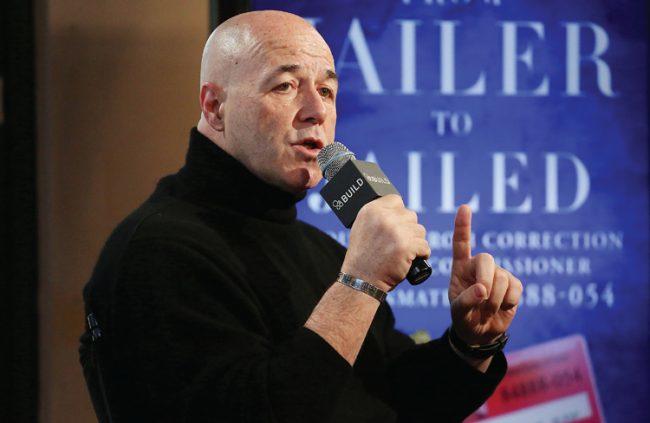The potential client was a well-known businessman, and he wanted Paul Viollis to understand that the seductress who was now blackmailing him was his “first rodeo.” He’d never stepped out on his wife before — honest, he insisted. This was all new to him.
Viollis, who specializes in fixing just such problems for the rich and famous, wasn’t buying it. The seasoned security consultant was at that very moment standing in the middle of a South Florida playground — he’d been watching his two grandchildren, 4 and 6, play when his office put the call through. But he wasn’t about to let his surroundings or the fame of the businessman, whose name he’d instantly recognized, distract him from doing his job.
“Look, I am happy to help,” Viollis, chief executive of Viollis Group International, told the man, noting he had been referred by a good client. “But if we’re going to work together, understand: Don’t lie to me, because I’ll fucking hang up the phone. You’re going to tell me what’s going on and let me see if I can help you. If I can help you, I’ll tell you. If I can’t help you, I will tell you that, too.”
The businessman quickly complied. Viollis knew he would. After all, people usually don’t call a fixer like Viollis because they want pleasantries — they call with urgent problems they need solved, preferably as fast and quietly as possible. Viollis, whose three-decade career spans stints at the New York County District Attorney’s Office Criminal Court Division, the Florida State Police and the security behemoth Kroll International, is a member of small cadre of consultants who specialize in providing security, traditional investigative services and crisis management to high-net-worth individuals.
Security consultants are a small but growing niche within the sprawling field of private investigative and personal security services. They often bill themselves as a powerful complement, rather than a strict alternative, to the option of contacting normal law enforcement. They are trained to evaluate security, gather evidence that can be used in court and know when it’s time to call in the traditional authorities or take a case to the DA. They usually have connections on the local force or at least know how to talk to and connect with detectives. They can do virtually everything the local police force investigating the case can do (except make arrests and issue citations). But they also offer something law enforcement often can’t — a sense of control, 24-7 service and strict discretion, which is especially important to high-net-worth individuals looking to keep a low profile.
And they’re available for hire if you happen to be on the wrong side of the law, expecting police to bash in your door at any  moment, or are wondering what to do after receiving that late-night call about your troubled nephew who was caught up in a drug bust.
moment, or are wondering what to do after receiving that late-night call about your troubled nephew who was caught up in a drug bust.
“Hey, look, it’s like anything else — if you got the money, you can hire the best,” said Bo Dietl, the former New York City police detective and media personality who runs the investigation firm Beau Dietl & Associates and whose clients have included Donald Trump. “We got thousands of years of investigative experience.”
In some ways, the existence of these specialty fixers is a natural outgrowth of the service economy. After all, high-net-worth individuals already supplement their children’s schooling with private tutors and test-prep classes to help them get into college. They employ decorators, drivers, masseuses, nannies, pilots, personal chefs, yacht captains and yoga instructors — so why should a high-stakes, sticky security situation, when one’s life, reputation or livelihood is at stake, be any different?
“Law enforcement resources and assets are spread so thin, and they are often so overworked, that a lot of times clients reach out to private investigative entities, really to do what traditional law enforcement can do as well,” noted Mike Perl, a former secret service agent and New Jersey native turned Floridian, whose global firm, Naples Security Solutions, is headquartered in a city with one of the highest concentrations of billionaires in the country.
“One day,” said Perl, “we may be doing due diligence in vetting a prospective C-level executive, and the next week we may get a call from the same corporate executive whose grandson was arrested for cocaine possession somewhere and we have to go mitigate that somehow and figure out the details.”
Prices vary widely, depending on the job and the need. Viollis charges $700 for a simple background investigation, with more advanced due diligence costing $2,500. Personal protection starts at $200 an hour. And general consulting is around $400 an hour.
Former NYC Police Commissioner (and ex-con) Bernard Kerik runs the Kerik Group, which provides crisis management and other security services. After being nominated for head of the Department of Homeland Security, Kerik withdrew and was caught up in state and federal investigations. He pled guilty to charges that included tax fraud and was sentenced to four years in federal prison. After his release, he published his second book, which advocates for criminal justice reform in the U.S.
Kerik noted that cost of private investigative work is entirely dependent on how much manpower a job requires — and that it’s impossible to estimate.
Dietl noted that he tries to work with people — but that the sky is the limit.
Investigative work “can go anywhere from $125 an hour to $350, then if we need experts on handwriting analysis, crime scene analysis, we actually do every aspect that the police department does, but on the private level,” he said.
***
The work men like Perl, Viollis and Dietl perform can be cautionary and preemptive — they scrutinize the proposed security and surveillance systems for that $50 million beach home you’re building in Southampton. They send along a couple of discreet individuals to shadow your kid down in Cancun on spring break. They run background checks on your new cleaning lady.
In a best-case scenario, said Kerik, “people of extreme wealth hire people like me because they want security assessments or threat vulnerability assessments on themselves, their family, their personal property, and if they are in the real estate arena, vulnerability assessments on their buildings.”
Not everyone, however, has such foresight, which is why Viollis estimates that roughly 80 percent of revenue is “event-driven.”
“We’re not putting people in trunks of cars,” Viollis said. “But are there issues that pertain to stalking, death threats, kidnapping, extortion, blackmail, threats against children, serial hacking into personal computers, theft of proprietary property, home invasion, things like that that we handle on a daily basis? Yes. There’s no question about that. We fix stuff; that’s what we do.”

Bo Dietl is a former New York City police detective and media personality who runs the investigation firm Beau Dietl & Associates.
Dietl has been called in on everything from big-ticket robberies to missing-person cases that have gone cold. Several years ago, he was hired by the wealthy family of a Manhattan gemologist who disappeared with $700,000 in fine-cut diamonds. The police refused to take a missing-person’s report and made it clear they suspected she most likely took the merchandise herself.
“Even if she stole the diamonds, she wouldn’t stop talking to her mother and sister,” Dietl recalled concluding shortly after a visit from the missing woman’s distraught sister. “This is an Italian girl who called her mom and her sister every day. They hadn’t heard from her. So right away I knew there had to be foul play.”
Dietl and his men were able to trace the missing diamonds to Palm Beach by getting in touch with the Gemological Institute of America, which grades and validates the appraisal of rare stones being offered for sale. They were waiting a couple of weeks later when two Italian men who had ordered the appraisal arrived to pick up their stones. Unfortunately, those efforts were too late to save the gemologist— her body was eventually found stuffed in a steamer trunk that was fished out of the Hudson. But the efforts proved crucial in putting her killers behind bars.
Sometimes the work of security consultants requires more than just old-fashioned gumshoe investigations. It requires connections, expertise— and just the right sprinkling of audacious bad-assery. In 2015, Perl, who cut his teeth guarding the Clintons and doing advance foreign travel work during George W. Bush’s administration, was approached by a high-net-worth American family and asked to retrieve their daughter and 3-year-old grandchild from Egypt.
Perl and his partner Chris Knott, a former Naval intelligence officer with experience in Iraq and Afghanistan, knew the case was risky. Both parents were doctors, the wife’s brother told them — his sister was Christian, and her husband was Muslim. Upon arrival for what the wife thought was a visit to Egypt, the husband destroyed their passports and informed his wife he would kill the family before allowing any of them to return home. Government officials had been unable to help them, the brother said. Money was no object.
Perl already had on-the-ground connections in Egypt, having been there as part of Vice President Dick Cheney’s security detail and for advance work for President Barack Obama during a visit to Cairo University. Perl said he knew the territory, the cultural norms, and had a Rolodex full of contacts he’d kept for situations just like this one.
“Within a day of receiving the call, we had surveillance assets on the ground in Egypt working, gathering intel for us,” Perl said.
The team mapped out a plan of operation on their way over and executed it within the first few days of landing, though not without some hair-raising drama. During the extraction, the mother-in-law awoke and began screaming, causing rifle-toting guards to converge on the scene. Passing the guards on their way down the stairs, an Arabic-speaking member of the team improvised. “Fire! Fire!” he yelled as a distraction. The guards continued, passing the fleeing extraction team without a second glance. Soon after, the woman and her child were reunited with her family in the U.S.
***
Having professional fixers on the payroll can also come in handy for high-net-worth individuals who find themselves — or a loved one— suddenly on the wrong side of the law.
In a worst-case scenario — say, a Robert Durst “Jinx”-type murder case — consultants might be involved in helping negotiate a surrender (though often a defense attorney is the one to do so), especially if they have a working relationship with a local police department.
 “That is quite common in the sense that they’ll hire us to work with the police department and— if they have to surrender— instead of the police going and knocking their door down, we bring them into the station house to surrender,” Dietl said. “The advantage is, you don’t get your door broken down at 6 o’clock in the morning when you’re sleeping.” Dietl added that his connections come in handy in these situations as well. “We can be very helpful referring attorneys who really know what they’re doing versus who doesn’t know what they’re doing.”
“That is quite common in the sense that they’ll hire us to work with the police department and— if they have to surrender— instead of the police going and knocking their door down, we bring them into the station house to surrender,” Dietl said. “The advantage is, you don’t get your door broken down at 6 o’clock in the morning when you’re sleeping.” Dietl added that his connections come in handy in these situations as well. “We can be very helpful referring attorneys who really know what they’re doing versus who doesn’t know what they’re doing.”
Other times the consultants use their gumshoe skills to help the legal team.
“We look for any errors or omissions, anything that we could use or that a legal team can use,” Perl said. “We would conduct a parallel investigation if necessary, talking to people that were with the subject at the time the event happened.”
In some cases, especially acute situations, the consultants may even make contact with individuals on the force. Kerik noted that the police have to be “very careful” not to give up an investigation or offer any information they shouldn’t.
“But listen,” he said, “guys who have retired from the job, they know guys still on the job. I’ll make a phone call and say, ‘Look, I have a client, and his kid got arrested last night for drunk driving. Can you let me know if he’s still in and whether you got to get him an attorney?’”
Perl will sometimes reach out to law enforcement even if he has no connection to the officers on the case.
“As a former federal law enforcement officer, I think I can more delicately communicate some of the other issues that are surrounding the case,” he said. “When it comes down to it, are you asking for special treatment? Absolutely, you are. Sometimes it works and sometimes it doesn’t. But I think having a former law enforcement official make that request for either a professional courtesy or leniency on behalf of a client” inspires those on the receiving end to be more receptive.
Perl noted that he would never risk his reputation by asking for such leniency in a case of an individual “driving drunk, crashing his car and beating his wife.” But he offered one recent example where the approach was warranted. In that case, a client’s grandson was caught up in a cocaine bust. The kid “just happened to be a passenger in the car. It wasn’t found on him.”
“We communicated with the arresting officers, and they saw our side of it and didn’t want to ruin this kid’s life, and we told him who his family was and all that other stuff,” Perl said.
There’s another advantage that can come in handy in some cases, noted Dietl. Private investigators aren’t bound by the same restraints as law enforcement.
“When you’re in law enforcement and someone tells you they have a lawyer, you’re not supposed to talk to them,” he said. “Someone tells me they have a lawyer, I say, ‘Good. I got a lawyer too.’ And I continue to talk to them.”
Nor does Dietl always stop there.
“You can talk to them if they’re harassing your client,” he said. “One of my really great tools is, you find out some negatives about them, and you just drop a little innuendo: ‘Listen to me; you continue to do this, this is going to make the press, and I think all those bankruptcies are going to come out, and a lot of people don’t know about them, but we’ll make sure that everyone knows about them.’ So you use persuasive commentary to neutralize the person who is attacking your client.”
In certain crisis situations, of course, there is another benefit to hiring a consultant that clearly trumps all others: discretion. That is especially true in cases involving blackmail and extortion. Most agree that it is almost always unwise to make the payment — because the blackmailer will likely come back again. But going to the police is not always a good idea, either.

Former NYC Police Commissioner Bernard Kerik runs the Kerik Group, which provides crisis management.
“Very wealthy people, the last thing they want to do is go to a police department, because the moment they go to a police department, it’s public record,” said Viollis, who estimated he handles six or seven such cases a month. “So if it can be handled quietly and it can be made to go away, then that’s really the optimal result, and that’s when they’ll call a firm like ours.”
Like in the case of that businessman who reached Viollis on the playground on that sunny South Florida afternoon when he was watching his grandchildren play.
The truth, the businessman told Viollis, was this: He’d met his extortionist on a business trip. She was young and sexy. They’d texted back and forth, shared pictures and gone on to have a brief affair. Then he’d had a crisis of conscience— and she’d wanted a relationship. An envelope arrived at his house soon after with pictures of them in bed and a demand: $500,000 in cash.
Viollis laid out his standard protocol. No emails. No texts. No more calls from regular phones. From then on, they’d use a drop phone and an encrypted account for electronic communication, designed to leave no record whatsoever. You couldn’t be too careful because anyone could be in on the extortion — including someone inside his organization, even household. (Was he a mark? Did somebody inside of his organization sell him out? How did they know where he was going to be?)
“It could’ve been his assistant who sold him out and set him up,” Viollis explained. “Is somebody taking a piece of this? I have no idea at this point. So I have to limit this, and I have to, what I call, sterilize the situation immediately, which I do.”
Then Viollis went to work developing a profile of the extortionist. After he found her email address, social media platforms, likes and dislikes, Viollis put surveillance on her, drew up a pattern of her activities and identified a quiet place to have “a little chat with her.” By then, his team had determined she was most likely acting alone.
“The guys that I use in this particular capacity, they’re accustomed to conducting this kind of interview, right? So we just went up and explained who we were and asked, ‘Can I talk to you for a minute?’ Now, if the person says no, you got to let them go. You can’t harass them. That’s a crime, but you say, ‘I just need a minute of your time, and I’m not going to disturb you, but I need to bring a couple of things to your attention,’ and that’s when you have this conversation, and it normally shouldn’t last longer than a minute to two and a half minutes, tops.”
In the conversation, Viollis had his man lay out the situation calmly.
“Look, my client really doesn’t give a shit about you,” the man said. “I’m sorry. What happened, happened. He’s not going to pay you. The end of the day, he’s going to walk away, and you’re going to be in federal freaking prison. You’re never going to get a job again. Your reputation is freaking ruined. Your parents are going to be humiliated. Your friends are going to be humiliated. Your life’s over as you know it. Is this worth it? Because you’re not getting a dime, and he doesn’t give a shit, and you’re not going to hurt him.”
Viollis continued, “When you appeal to somebody like that, that’s when you put reality back in the situation and you’re able to seriously mitigate the risk of blackmail and extortion. That’s typically how that’s handled, and you know what she ended up saying? ‘The only thing I want is, I want an apology. He doesn’t have to put it in writing, but I want him to call me and apologize, and I want him to mean it, and I’ll forget about this.’”
“So I called him and said, ‘You put on your most fucking serious voice and get rid of your attitude, and this thing goes away today.’ Done. Done, and you know what? We’ll never hear from her again. And that’s just one small example of the myriad of things that we have got going on a daily basis.”
Adam Piore is a freelance writer who writes long-form narrative articles about science, business and politics. His first book, “The Body Builders, Inside the science of the Engineered Human,” will be published by HarperCollins Ecco on March 14.
